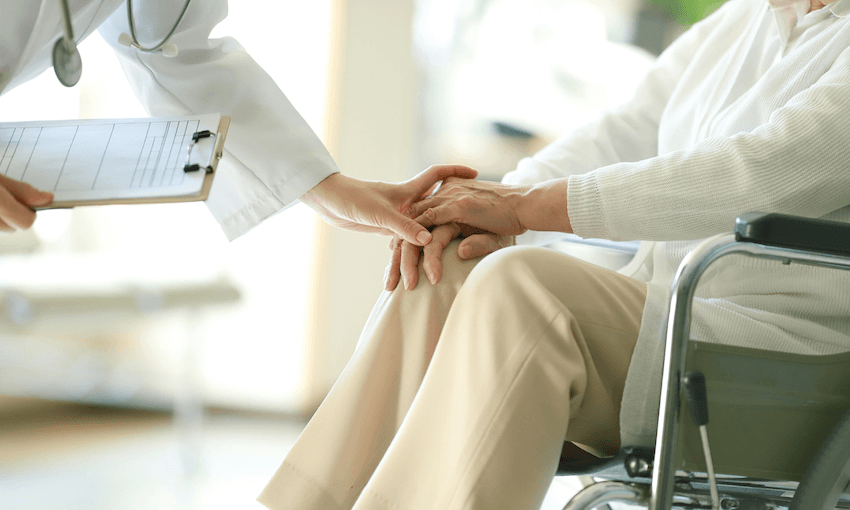Robyn Hunt writes on the challenges facing disabled people and what needs to be done to support them in lockdown and beyond.
Disabled people at higher risk need more help. Many of the almost one quarter of New Zealanders who are disabled are doing it hard as the country goes into lockdown. If the levels of anxiety are high in the general population, they are even higher among disabled people who are more at risk on a number of counts. It’s also a deeply anxious time for families with disabled children.
Under Article 11 of the Disability Rights Convention (CRPD), the New Zealand government has an obligation to “take… all necessary measures to ensure the protection and safety of persons with disabilities in situations of risk, including situations of armed conflict, humanitarian emergencies and the occurrence of natural disasters.”
But that’s at odds with the hurtful ageism and ableism of the flippant, faintly eugenicist line that we hear so often – that only the old, the ill and people with compromised immune systems will die. It’s an idea which has caused distress and even fear among the disabled community, which of course also includes many older people. There is a feeling among disabled people that they are being pushed aside by public bodies and public panic in this crisis.
One example of this is a recent announcement from Metlink in Wellington that it would no longer board buses from the front door, because of Covid-19 concerns. “Metlink apologises to customers who rely on the accessibility options provided at the front door and encourages customers to find out more about Total Mobility services during this time by calling 0800 801 700,” the announcement read.
A message like this completely negates the accessibility features for people who need the ramp. The instruction to explore Total Mobility is pointless, since it’s likely that no new users can join during lockdown, and it’s not an option anyway because Total Mobility vans are like hen’s teeth even at the best of times. Pushing disabled people away from public transport also adds extra cost to travel for some of the poorest New Zealanders. While Metlink says it is working on alternatives – and during lockdown buses cannot be used by much of the population – it’s causing stress to disabled people who rely on buses.
Panic buying in supermarkets has been dog-eat-dog, and shopping for food is now difficult for disabled people without transport. A friend who uses a stick said she had experienced hostile glares as she shopped. People who are blind, have vision impairments or who are slower for any reason are missing out. Even if you could get your groceries delivered it comes at a cost which may be a deal breaker for some, since disabled people are among the poorest of us. They are having to rely on the kindness of friends and others, especially those who are physically isolated or on their own. Happily there is kindness in the community.
A disabled person facing the next four weeks alone apart from support workers posted updates on Facebook about their position in the Countdown phone queue. At the time of posting they were 123rd. The person was posting on social media to draw attention to non-disabled people first taking the available supermarket delivery slots and then clogging the phone lines.
It is encouraging to see that Countdown is now providing a priority delivery service for older and disabled customers. This service comes as a relief to many disabled people, including myself.
I’m also pleased that the Deaf community will continue to have access to Sign Language interpreting for essential services such as government updates. And video services like Zoom can be a godsend for accessing non-essential services.
Still, the mental health of people in the disability community is of concern. They are experiencing high levels of anxiety, stress and depression because of all the extra difficulties they are encountering. Some disabled people have already chosen to be in self-isolation for a week or more. Others have found that more difficult. The Ministry of Health has a page of fairly high-level advice for disabled people here and specific advice on personal care and support services for disabled people are included in essential services here. You can also find information for the Deaf community here.
But the disability community has not been idle either. Two groups have been set up by the Ministry of Health Disability Directorate to focus on the unique issues that disabled people and their families are facing. These groups include representatives from disability service providers, Needs Assessment Service Co-ordination, the Ministry of Social Development, the Hutt Valley, Wairarapa and Capital Coast DHBs, the Office for Disability Issues, the Disability Rights Commission and the coalition of Disabled People’s Organisations (DPOs).
The first group – the solutions group – is identifying issues specific to the disabled community and finding practical solutions to them.
The second – the communications group – focuses on communications within the disability community. This group is communicating accessibly with the disabled community. This means making sure information is available in accessible documents, including large print, Easy Read, braille and audio. Information in New Zealand Sign Language and online accessibility are necessary too. The communications group is also gathering concerns of disabled people and their DPOs, making sure they are heard and addressed. This group directly links into the solutions group, and will provide feedback to them.
Disabled and older people should be able to ask others in their communities for help, especially with things like shopping and collecting prescriptions. But it’s up to everyone to be neighbourly and make sure others are OK, especially if they are alone in their bubble, or simply to keep in touch with a friendly phone call, email or chat over the fence at a two metre social distance. After all, we’re all in this together and we all need to support each other.
